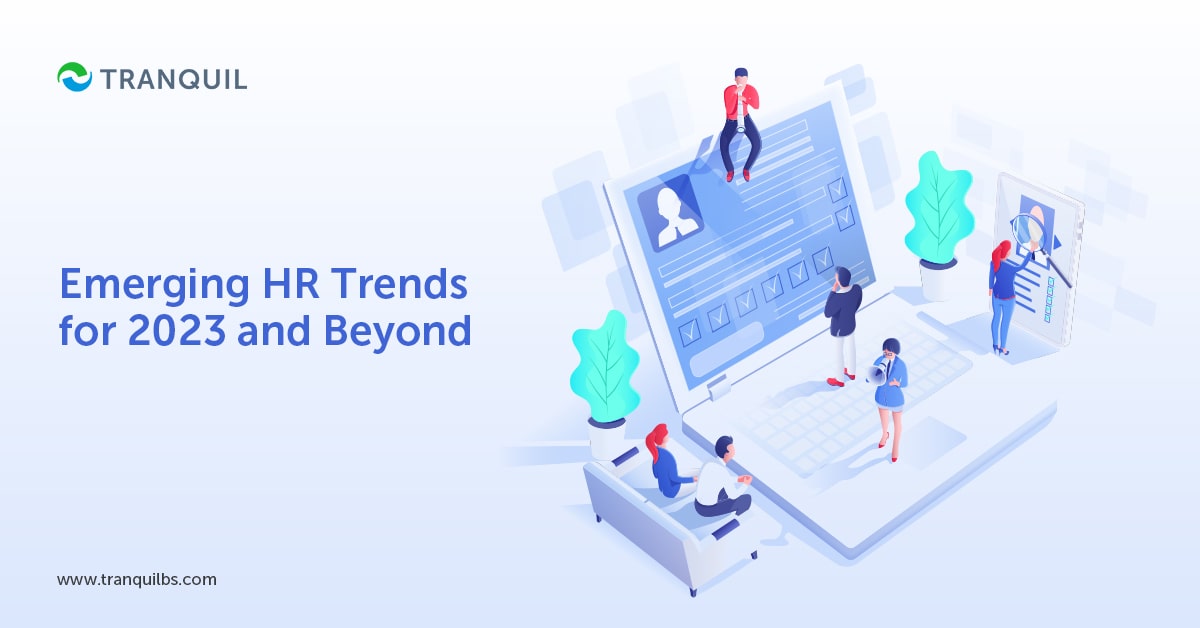The workplace has changed in recent times, no thanks to the Covid-19 pandemic; what had started at that time as a temporary necessity, is slowly becoming the norm today.
The relationship between employees and employers has changed significantly and continues to evolve.
Without further ado, let’s take a look at the HR trends that are true not just for this year but for some time to come.
HR Trends
1. Well-Being of Employees
Stress at the workplace is increasing; employees are constantly under pressure to perform and meet targets if not exceed them.
This stress can negatively impact not only the health of employees but also their relationships with one another, with the management, even with family and friends.
Ergo, an increasing number of people are looking for employers willing to provide working environments that help them maintain their well-being and support their mental health.
In fact, some companies are appointing people as Health and Wellbeing officers.
ALSO READ: The Must-Have Modules and Features for an HRMS
In surveys conducted among employees from various industries, here is what they identified as important:
- Offering free counseling sessions for themselves and immediate family members
- Helping them to be better at personal finance like managing credit, saving money, etc. through financial education programs.
- Providing healthy food options in cafeterias and break rooms
By investing in and focusing on employee well-being, companies can help employees thrive not just at the workplace but at home and the society in general – happy employees are also loyal employees and more productive employees.
2. Skills-Based Hiring Over Academic Qualification

It is becoming more and more common for companies to hire employees with a specific skill set rather than by their college degrees.
They prefer to assess employees through tests that check if they have the skills required for the job.
This actually makes the talent pool bigger for the employers; it also means that talented workers without degrees now have a better shot at a good job.
This approach also adds diversity to the workforce.
It is especially successful in the IT sector – many employees working in computer support or software engineering, have no degrees, but they are exceptionally good at what they do.
It is expected that this trend will only accelerate in the near future.
ALSO READ: Need of Having HR & Payroll Management Software in SMEs?
3. Flexibility
This is one of the biggest trends in HRM; it had become a necessity during the global pandemic, but is slowly becoming the norm.
We are not talking only about remote work, but choosing one’s work hours, and even days.
Some employees may choose to work only four days a week, but work more hours on those days; some may prefer to work a few hours six days a week, and so on.
When workers are allowed flexibility, they are able to fulfil other roles in the family and society, and this makes them happy.
This is of course, a major cultural shift from the conventional 9 to 5 model.
Of course, it may not be possible to offer such flexibility to all segments of workers across all industries, but some degree of flexibility can surely be given, seeing that employees today demand it.
4. Hybrid Learning
This is slowly replacing brick-and-mortar corporate academies.
Online classes and in-person training on the premises (at the workplace) is being preferred by employees and management alike.
With rapid technological advancements, it is now possible to stream live to multiple locations, with everyone involved being able to interact with one another, creating a near-classroom experience.
In the not-so-distant future, we may well see corporate we, where learners attend classes online, either at their own workplace or at their company HQs, in satellite offices, and so on – the popup campus.
ALSO READ: Benefits of Public Cloud Computing
5. Increased Scope of ESG Reporting


Environmental, social, and governance reporting is becoming more and more important today, not just because of increasing regulations and compliance requirements, but also due to pressure from directors on the board, investors, and other stakeholders like consumers, employees, candidates, etc. being accountable for ESG goals has become an essential element for corporates today, as everyone demands transparent ESG performance; everyone wants to know the impact you have on the environment and society.
Most stakeholders also want independent audits to be conducted so that the company can be certified properly.
How is this related to HR? ESG metrics are being considered in variable remuneration plans for executives; there is an increasing call for diversity in the workforce both current and new, developing the next generation of talent, transparency, and equity of pay.
Today, more prospective employees are looking at whether companies are serious about ESG before they make the decision to join.
Ergo, HR leaders will have craft strategies that will address the impact ESG reporting will have on their companies, and ensure that the corporate strategies are in tune with ESG impacts.
ALSO READ : How ERP Software is Playing Role to Improve Business Productivity?
6. Human and Inter-personal Skills


Since 2016, there has been a marked change in the skills required by companies.
In 2023 and beyond, the desired skills are more human than technical (which are still valued highly of course).
These include:
- Communication
- Collaboration
- Attention to detail
- Leadership abilities
- Customer service
- Cultural and social intelligence
- Inclusivity
- Focus on achievement
- Personal learning
Industry leaders stress the importance of focusing on the development of human skills in the time of rapid digitalization.
While these skills were always important, they are becoming absolutely essential today.
ALSO READ: What is Negative Inventory?
7. Hybrid Working
Hybrid working, which took off in a big way in the days of the pandemic has already become the new normal.
It is a win-win situation for employers and workers alike; employers can save on leasing or renting huge office spaces and paying conveyance allowances and employees can work from the comfort of their homes.
Hybrid of course refers to a combination of remote work and working on the company premises, or on-site.
New employees may be required to work initially on site, and then reduce the number of days they come in.
Many employees are also willing to take a cut in their wages to be able to work remotely.
It is important for employees and managers to have a clear understanding on the guidelines for remote working, including hours for collaboration, requisite tools and technology, team norms, and so on, for this method to be successful.
This can also help employees to be less stressed and more productive.
ALSO READ: Benefits Of Software As A Service
8. Better Employee Experience Through Collaboration and Events
With hybrid and remote learning and work becoming more commonplace, offices are undergoing a sea change as far as design and layouts are concerned.
While employees continue to demand flexible working arrangements, employers stress the need for physical presence every now and then.
It’s true that close networks and teams in immediate contact become closer through online interactions and remote work, secondary networks shrink and become weaker.
This means that there is less innovation and collaboration – and hence a need for employees to come back to the workplace.
It is vital that employers re-imagine the workplace to also provide opportunities to hold community events in addition to facilitating increased collaboration among employees.
ALSO READ: Second Phase of E-invoicing in Saudi Arabia
9. HR And The Metaverse


According to Gartner, a quarter of the Earth’s population is likely to spend a minimum of one hour in a day, in the metaverse.
Companies that want to do the smart thing, will start using this space to kick start some activities, like virtual events, meetings, career fairs, and onboarding new employees.
The metaverse can also be used for training and learning, as Meta is investing a massive amount to create a learning ecosystem that will be immersive and make learning much more accessible.
Companies that get on this bandwagon early, will definitely seem more attractive to the younger breed of prospective employees, and be seen as a futuristic organization.
They can engage easily with candidates in remote locations, and even boost productivity.
ALSO READ: Guide on ERP Upgrade
The organizations that invest in the metaverse will certainly set themselves above the crowd, and be seen as innovative, and truly invested in employee satisfaction and wellbeing.
This is also an opportunity for HR to redesign the virtual workspace; after all, how a space is laid out, defines how it is used by people.
The metaverse has opened the doors to greater collaboration, creation, and innovation, as it has no restrictions of the conventional physical norms – this also makes it more inclusive, as employees with disabilities will be able to participate without hassles.
HR leaders just need to ensure that the metaverse does not become a distraction, and must use it as a means to achieve an end – boost productivity and revenues.
10. Blended Workforce of Humans and Bots
Earlier, a blended workforce meant a blend of fulltime, contract, and part time workers; not anymore.
The rapid strides of automation have altered this definition irrevocably.
Today we have automated, self-serve solutions or robots, AI tools, and more, that have taken over several of the tasks performed by humans.
In such a scenario, managers and HR leaders must make sure that AI is transparent and they should be able to explain what it is all about; workers are likely to be needed to operate many of these AI tools, and they should understand how it works, and their apprehensions cleared.
For instance, will they themselves become redundant quickly because of the very tools they operate?
ALSO READ: Challenges and Benefits of CRM
11. Employee Burnout Is A Crisis


It is a very real crisis, and has to be checked, and checked immediately.
It is critical that you check in with your team members on a regular basis, and make sure that they are content and healthy both physically and mentally.
The workers of today are on the cusp of massive and radical workplace changes, and it is going to necessitate a lot more than the ordinary people management on the part of the HR leaders to ensure their wellbeing and workplace satisfaction.
It goes without saying that this crisis is a direct result of the Covid-19 pandemic.
It shows us that the role of HR has suddenly become a lot more complicated and involves strategy, and has become more cross-functional.
ALSO READ : Benefits of ERP for Accounting and Financial Management
Conclusion
HR leaders need to have a good understanding of the sweeping changes that are affecting human resources, and be able to provide proper training, comfortable workplaces, healthy environment, recognition and appreciation of employee contribution to the company’s success, and a lot more.
HR is a critical function of business, and it is vital that you manage your employees well. High attrition can be expensive for your company as you have to repeatedly incur costs for hiring and training new employees frequently. Tranquil ERP has a robust HR module that helps you streamline your HR activities, and save you time, money, and effort. Ask for a FREE demo now, and we will show you how it works.





